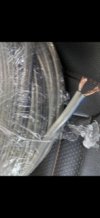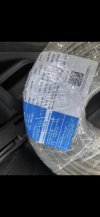Though there is a hype around high cost/ grade loudspeaker cables, I am yet to come across a company that will put the electrical parameters of a cable on paper and tie it to superior audio quality. They do use better core and insulation material which get categorized into built quality not audio quality.
Let us assume that a cable manufacturer shows the difference on an oscilloscope. My question is: Do we see audio or hear it? Another question: How much extra are you willing to pay for audio that looks clean but sounds the same to naked ear?
For hecks sake, let us analyze the parameters of a cable that WILL affect sound quality:
1. Wire resistance is the only parameter that will matter in almost all cases. It will cause gain loss that can be compensated easily with volume/ gain setting.
2. Cable capacitance: For the length of wire that we typically use at home, or for that purpose in multipurpose halls, its nothing that will cause filter effect at low, mid or high frequencies.
3. Cable inductance: Usually causes unloading of amplifier at high frequencies. However, a good amplifier design almost always has a Zobel network (R-C combination from amplifier output to ground) that keeps the amplifier loaded. In my practical experience, I have never seen or heard a cable causing an amplifier to unload.
So, again, go ahead and use good grade electrical cables. No problem.
There is one brand mentioned above: Belden. It is a very highly respected brand. The material used is visibly superior to anything I have seen.
Personally I have used two core shielded wire for signal, not speaker. I used it for cinema projector sound pick-up. I could have used any Janta brand. But projector area is prone to carbon dust, oil spills etc. I chose Belden as I knew it can handle all dirty environment around it.
I hope that this helps.
Regards,
Ravindra.



